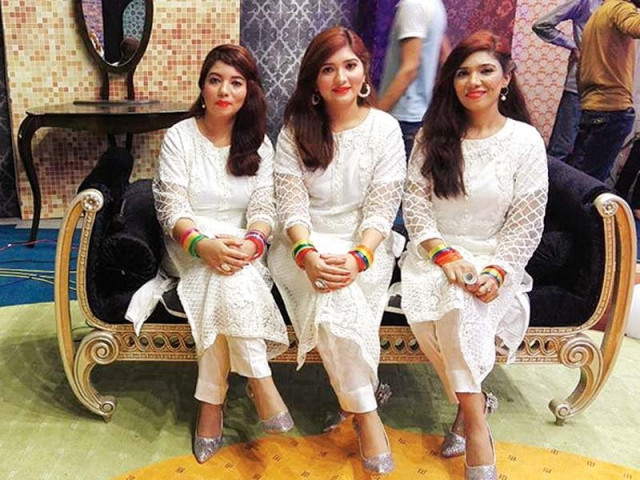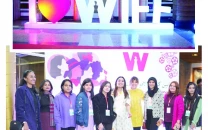Manwa Sisters: Pakistan's first female qawwal group to release debut song
Pakistan’s first female qawwal group, Manwa Sisters, set to release debut single

They may have formally launched their group just a while ago, but the sisters have been singing together ever since they were young. PHOTO: FILE
Comprising Saba, Fauzia and Zille Huma, the band has been moving from strength to strength ever since its arrival in Lahore. Hailing from Faisalabad, the sisters belong to the qawwali singing family of Kerala gharana that has produced numerous renowned musicians in the past.
Apart from qawwali, the sisters are also into film music and frequently perform popular numbers of their idols Nusrat Fateh Ali Khan and Noor Jahan. Allah Janey is their first attempt to put out an original song.

Talking to The Express Tribune, the group’s front woman Saba said their family has had a long association with the trade. “Indian superstar Dilip Kumar would frequently invite our grand uncle Rasheed Faridi at his place to listen to him. After our grandfather’s death, no one was interested in continuing with music.” Perhaps this is what spurred the girls into action.
When asked why they named the group Manwa, Saba laughed, saying, “We chose the word Manwa because that (literal meaning of the word in Urdu) is what we want to do. We want to get our talents recognised.”
They may have formally launched their group a while ago, but the sisters have been singing together ever since they were quite young. “We have been singing at family events and private functions for a while. It wasn’t until three years ago that we finally decided to start our group and take music up as a profession,” she added.
Honing their skills under the tutelage of many masters of Indian classical music and qawwali ever since, the girls decided that in order to advance their careers, they will have to move out of Faisalabad. “We thought moving to Lahore would be a great idea. We will get to perform at bigger events and find more career opportunities,” Saba said. For the past 12 odd months, the sisters have been residing in the provincial capital.

Dilip Kumar would frequently invite Manwa sisters’ grand uncle Rasheed Faridi at his place to listen to him
Making ends meet
During their many TV and stage appearances, the girls performed Lollywood hits and even folk and semi-classical tunes. However, they feel their forte lies in qawwali. “We have tried to adopt the qawwali style because it comes very naturally to us. It is in our blood,” Saba said.
Zilla Huma pitched in by saying that they are aware of the trends in the music industry. “Besides qawwali, we also sing light stuff and will continue to release such singles in the future,” she added.
Leading a proper qawwal party is no easy task. For industry amateurs, it is quite a challenge from a financial standpoint. “At the moment we are not making a lot of money so we cannot run a whole party and hire all the musicians. How will we pay them?” asked Saba.
For now, the Manwas have decided to stick to keeping the band small. Meanwhile, they are still working on their vocals with a training programme at Alhamra. In order to keep the stove burning and afford the challenging career that they have taken up, the sisters also give private tuitions to schoolchildren in their locality. “All three of us completed our graduate degrees while in Faisalabad. Things are expensive here in Lahore so tuitions just help with that,” Saba said.
Once they establish themselves in the city’s entertainment circuit, these girls want to be known solely for their qawwali singing. When asked if the three ever have any disagreements over who will lead or who will sing a particular part, Saba said, “Not at all. There’s unity among us. In fact, we find it difficult to sing with anyone else, such is our understanding.” The sisters have already been approached by numerous artists to join their bands. “For now we want to stick with our own group. In the future we might consider collaborations.”
Family first
Often referred to as the Manchester of Pakistan, thanks to its industrial estates, Faisalabad was introduced to the world by its prodigal son Nusrat Fateh. Nusrat’s name was taken forward by his bright nephew Rahat Fateh Ali Khan. While the city is famous for its qawwals and the many families associated with music that still live there, Saba said getting help is not easy. “No gharana is willing to help us. They don’t want to teach anyone,” she said.
On the other hand, their gender, too, is a problem. “Girls, in the past, haven’t normally ventured into qawwali singing and we hardly come across a proper female qawwal in the Indian subcontinent,” said Zille Huma. “The challenges are there but we are committed. We have been doing it for three years now and have been appreciated for our work. Wherever we go, we get a very heartening response.”
Published in The Express Tribune, August 3rd, 2016.
Like Life & Style on Facebook, follow @ETLifeandStyle on Twitter for the latest in fashion, gossip and entertainment.



















COMMENTS
Comments are moderated and generally will be posted if they are on-topic and not abusive.
For more information, please see our Comments FAQ